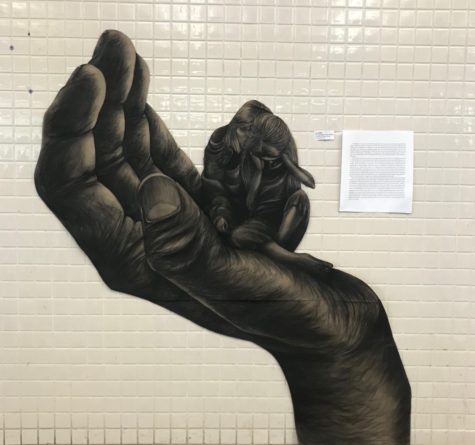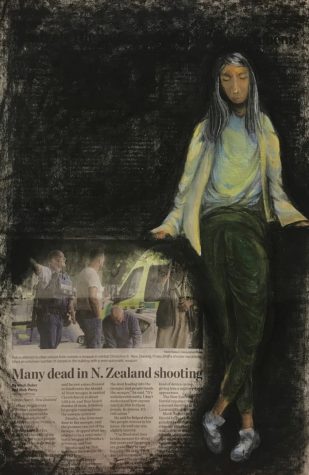Marie Miller
The People’s Beach
Another flying alcapurria clears the windowsill and is caught by an
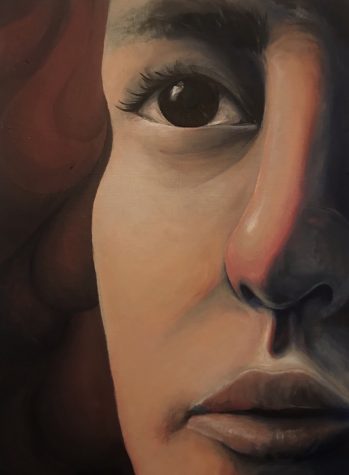
outstretched hand. The peddler has adorned his truck with lovely little posies sprouting from old tires, and an American flag hung dangerously close to a wavering flame. His People are congregated amid flimsy metal tables; they are tipsy, full, and overwhelmingly happy.
I’m wandering idly in and out and back into a frothy surf, alcapurria in hand, when I catch sight of a softened chunk of seaglass- the most impressive I’ve seen all day. I settle to inspect. Straight away, I am flocked by five curious, water-winged children. I wave, grin, and proudly wield the clouded gem for them to see. They are gathering around me, tugging playfully at my salt-petrified curls, carefully piling clumps of sand on my legs, and I try to help raise a castle amidst the chaos. Mother hastens over to assure I pose no threat, and later on, apologizes for her accent when she asks where I’m from. I assure her that she speaks beautifully, I tell her her children are wonderfully sweet. And in the end, I withdraw my knees from the crowded little pack- in the process crumbling ten minutes of primitive sandcastle architecture- and bestow upon one chubby hand my seaglass. I watch the prize bob away, in the soft grasp of my new little friends.
I move back eastward along the water, pursuing the ever-fluctuating companies of people, and the billowing tarps tied over them. This is the sand on which they worship pulsating waves and golden sun and that hot, hot breeze. This is their church. Splintered picnic tables become alters; browned, half-naked children become gift bearers, delivering sandy Corona caps onto plastic table coverings. A feast, more or less, is spread over these gifts. Lovingly prepared by flitting mothers who will soon be wiping mofongo from the mouths of their babies, and from the mouths of their own mothers- ancient, sedentary women propped up rigidly in beach chairs, their leather faces dark and wrinkled from so many years of twisting up towards the sun. Fathers, grilling away, warble along with the Danza royalty of their island, whose voices rumble out in clouds from portable, impossibly powerful speakers. This altar is their dining table, this beach their canteen.
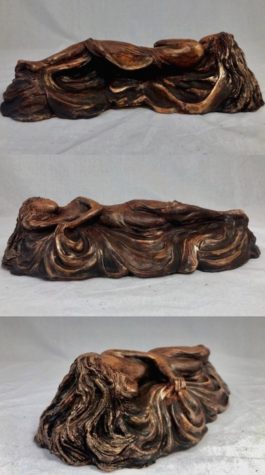
Alcapurria peddler crosses abuela. Drunkard crosses crooning dad. Curious child crosses out-of-place-teenage New Yorker. Affliction meets enterprise. Immorality meets virtue. Each thread begins and ends with another, and in the course of this muddled picture, every one is snagged and twisted and drawn over one more. They all gather on the same sand, wade the same water, feel the same sun on their skin. Here is a wonderfully chaotic celebration of humanity; here is truly The People’s Beach.
And here I am, 17 years old, blooming out of this world of magic and liveliness- this web of interwoven stories. The value in telling my story has become just as important as watching another unfold. I find myself rooted into the Writing Center, coaxing my peers to find the words to express their own stories. I find myself teaching my tutees to speak their truth as we navigate English as a New Language. And I find myself arm in arm with the young women of Girls Take Charge, carving out the beginnings of a lifelong narrative of strength and leadership. People, as they seem to me, are defined by two things: the world they emerge from, and the lives they lead. I will be defined by a network of characters, culture, and ideas that grows around myself- defined by the advice I give, and the future I inspire. Life will swell with the waves and still will I walk, tasting alcapurria on the wind; a sliver of turquoise seaglass tugging at the end of my thread; my footprints left in the sand of The People’s Beach.
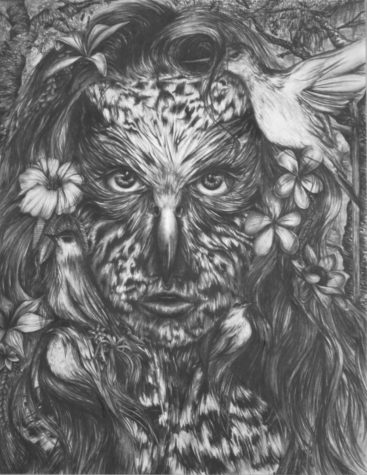
To Reach a Beginning
Scales, as they seem to me, reflect in chrome the way the sun dances on water.
Fins fan out over a plump underbelly resting on the edge of the sink. She is fluttering gently these fans,
pulling and launching and pulling them back against her body, emerald and brown amassed into a bulging
lump. She falters in and out of consciousness, having been dragged, exhausted and succumbing to the
line, from the water an hour before. Fish die slowly and mercilessly out-of-lake; she is drowning with
each gaping mouthful of air.
The blade presses gently at the fat behind her gills, and the scarred, leathery hand of a seasoned
fisherman stretches along the arch of her back, holding her yellow belly to metal. Firmly. And I am
standing small in the doorframe of our laundry room decorated in my grandmother’s lovely floral
wallpaper, watching in horror as her skin is split and blood and those beautiful shining scales culminate at
the peak of the knife which disappears deep and fast and certain into what I can say is her neck, if fish had
necks. My grandfather, hand melting into the knife that melts into the fish. He severs her head smoothy
and surely from her body, his eyes glazed over as he pushes it aside with the point of that rapacious
cleaver. Sinews radiate from her backbone- pink, fleshy rings spiraling from an epicenter. Her core is that
of a tree, that of an oak having grown layers of overlapping years. The eyes, glassed in scales and buried
in an isolated head, forget that she is dead. They are wide and uncertain and filled with terror. I see myself
in hers; my own eyes are wet with tears in the moment I bring one hand to the warm pulse of my throat
and the other to the silkened film of her fins. Dusty summer light filters through a screen door beyond the
sink. My eyes, unadjusted, see nothing but intensity mirrored over water.
Her spine is flung back later to the hungry lake from which she was plucked, set to dissolve into
nothingness among rocks laced with algae and hundreds of murky years. She is eaten in the morning,
prepared with butter and fried in a cast-iron pan.
…
Years later, as I am deep in the age of “becoming,” the sun rises over an ocean, animate and
replenished by means of the moisture from the clouds. Drawn, in turn, from rivers and lakes and
bodies of melted fish.
Where sneaker meets sand, I am weighted for an instant to the Earth, gaining little by little on the curve
of the horizon. I am running just out of reach of the waves when my soles are caught and dragged to a
steadfast stop against the ground. I, mid-flight, am brought to a standstill by a procession of life at my
feet. The fledglings are surfacing from a bowl of a nest in the dunes. Sand falls in waves around them as
they climb, and their wings leave behind petalled impressements, in nearing the frontier of water sliding
up onto beach. They are nothing but shells, propelling themselves into existence on segmented wing;
striking desperately before stretching up and coming down hard and sure. I see the shadows of knife in
gnarled hand accompanying every beat. Baby turtles, cased in sand and keratin, still vulnerable, as they
would be for quite some time. But the tides, sheets of glass edged with a burgeoning froth, crawl up
oh-so-gently to meet halfway and welcome them, pinwheeling over themselves, home to the ocean.
I have started from an end to reach a beginning. In truth, rather a vague beginning: most of the turtles
will be slain within the year. But a few will live to reemerge from the surf in the coming years, and lay
their own nests. Here I am, sixteen years old, and I know nothing. All I am sure of is that I will die blind
with the fish, turn with the floods, burn with the sun, and rise into wavering light with the turtles.
